Lady Jane Grey
Jane was tried at Guildhall, with her husband, on 13 November. Both were found guilty and sentenced to death. Even at this stage, Jane did not expect to die. Indeed, the new Queen Mary probably had no intention of carrying out the sentence. It is thought that the civil disturbance known as the Wyatt Rebellion, changed her mind.
Sir Thomas Wyatt raised a small band of protesters in Kent, angered at Mary's choice of husband in Philip of Spain. A Spanish King on the English throne was unthinkable. Wyatt entered the City on 7 February 1554, however he failed to acquire the support of Londoners, and was arrested by soldiers loyal to the Queen. Henry Grey's part in the rebellion made Jane's execution inevitable. Grey had returned to Bradgate where he had set about raising resistance in the Midlands. He was captured before he could do so.
The success of Mary's alliance with Spain depended upon the stability of her kingdom. She was left with little choice other than to remove every trace of unrest. On 7 February Mary signed the death warrants of, 'Guildford Dudley and his wife...' The execution was set to take place two days later.
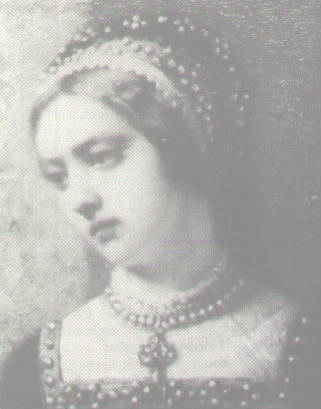
Execution at age 17
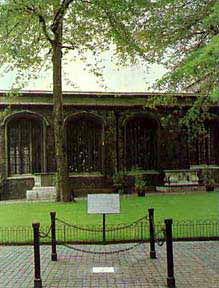
--------------------------------------------------------------------------------
The site of the scaffold on Tower Green, as it is today. The Chapel
Royal of St. Peter ad Vincula can be seen behind.
--------------------------------------------------------------------------------
On 8 February 1554, Jane was told to prepare for death the following morning. It was on this day that Dr Feckenham, Mary's chaplain, visited her to offer religious counsel and the opportunity to convert to Catholicism before her death. Jane told him, 'I am ready to face death patiently and in whatsoever manner it may please the Queen to appoint.' She went on to say that she, had no time for the 'controversy,' between the two religions. All that she sought, was the peace to ready herself for death.
Feckenham took her reference to lack of time literally. He believed that Jane may have felt the need to recant her beliefs but did not have enough time to do so. He informed Mary, who granted Jane and Guildford a reprieve of three days for their 'spiritual enlightenment.' When Feckenham informed Jane, she was dismayed. 'Alas, sir! I did not intend what I said to be reported to the Queen, nor would I have you think me covetous of a moments longer life. I am only solicitous for a better life in Eternity and will gladly suffer death since it is Her Majesty's pleasure...Let me make my peace with God.'
Feckenham was later to report that he was struck by Jane's gentleness
and honour. He asked that she may allow him to accompany her to the scaffold,
to which she consented.
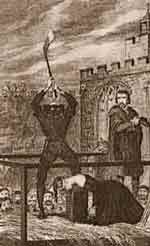
--------------------------------------------------------------------------------
A representation of Lady Jane's execution.
--------------------------------------------------------------------------------
It was decided that Guildford would be executed on Tower Hill and Jane
within the confines of the Tower. On 11 February Guildford requested the
right to meet with Jane. Mary consented, adding that she hoped it would
be of some consolation to them both. When word was sent to Jane, she refused,
replying that, 'it would disturb the holy tranquility with which they had
prepared themselves for death.' Jane added that her presence would, 'weaken
rather than strengthen him,' that he should, 'take courage from [his] reason,
and derive constancy from [his] heart.' If his soul was not at peace she
would not settle it with her eyes, nor confirm it with her words. They
must postpone their meeting until they 'met in a better world, where friendships
were happy, and unions indissoluble, and theirs,' she hoped, 'would be
eternal.'
Around 10 o'clock on the morning of 12 February, Jane watched from her
window as her husband was led from the Beauchamp Tower on his way to Tower
Hill. She was still at the window when his body was brought back into the
Tower, his head wrapped in bandage at his side. Those in her company reported
later that she wept openly at the sight, and was heard to utter his name
and something about the 'bitterness of death.'

--------------------------------------------------------------------------------
Left: Guildford's body is brought back to the Tower in a cart. Jane,
the figure to the right, in black, looks on.
--------------------------------------------------------------------------------
Jane had spent the morning in prayer and writing letters of farewell. Shortly before 11 o'clock she was collected by the Lieutenant of the Tower, Sir John Brydges. Jane then made her way to the scaffold, clutching Brydges arm.Yeoman of the Guard surrounded the wooden structure that had been erected the day before. At the scaffold, Jane was met by Dr Feckenham, along with several other Tower chaplains.
An observer recorded what took place. Jane then spoke to Feckenham; 'God grant you all your desires and accept my own hearty thanks for all your attention to me. Although indeed, those attentions have tried me more than death can now terrify me.' She then climbed the stairs, 'nothing at all abashed...neither her eyes moistened with tears, although her two gentlewomen...wonderfully wept.'
Jane then addressed the crowd and recited the fifty-first psalm in English. Dr Feckenham followed in Latin, after which she told him, ' God I beseech Him abundantly reward you for your kindness to me.'
Jane then gave her gloves and handkerchief to her lady-in-waiting, Mrs Ellen, and handed her prayer book to Sir John Brydges. When she began to untie her gown herself the executioner stepped forward to help, but she brushed him aside. Mrs Ellen helped her to remove her headdress and neckerchief, and dispense with her heavy outer garment. The executioner then knelt and asked for Jane's forgiveness, which she gave 'most willingly.' There followed a five minute silence, whereby officials await a last-minute reprieve from the Monarch.
The executioner then told Jane where to stand. She replied, 'I pray you despatch me quickly.' She began to kneel, then hesitated and said, 'Will you take it off before I lay me down?' The executioner answered, 'No madame.' Jane then tied the handkerchief around her eyes. Unable to locate the block, she became anxious, 'Where is it? What shall I do? Where is it?' she asked, her voice faltering. Those who stood upon the scaffold seemed unsure of what to do. 'One of the standers by' climbed the scaffold and helped her to the block. Her last words were, 'Lord, into thy hands I commend my spirit.'
According to tradition, her head was then held aloft with the words,
'So perish all the Queen's enemies. Behold, the head of a traitor.'
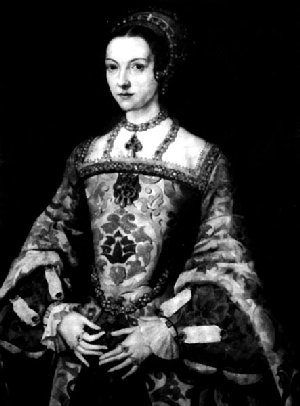
After the Execution
Jane could not be buried in the Chapel Royal of St. Peter ad Vincula
within the Tower as it had been returned to Catholic worship. Dr. Feckenham
rushed to seek the required permission during which time Jane's body is
said to have remained exposed. Davey reports that it was seen by the French
ambassador four hours later, still upon the scaffold. During this time,
according to Davey, Mrs Ellen and Mrs Tylney, Jane's waiting women, were
unable to attend to the body.
Correspondence
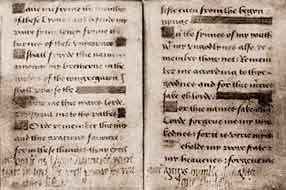
--------------------------------------------------------------------------------
Jane's prayer book that she carried to the scaffold. The letter to
her father written, in her own hand, hours before her death, can be seen
at the bottom of the page. The book is now on display in the British Museum.
--------------------------------------------------------------------------------
In the book, Jane wrote...' The Lord comfort your Grace and that in
His word wherein all creatures only are to be comforted. And though it
hath pleased God to take two of your children, yet think not, I most humbly
beseech your Grace, that you have lost them. But trust that we, by leaving
this mortal life, have won an immortal life. And I, as for my part, as
I have honoured your Grace in this life, will pray for you in another life.
Your Grace's humble daughter, Jane Duddley
Letter to her father...
Although it hath pleased God to hasten my death by you, by whom my life
should rather have been lengthened, yet can I patiently take it, that I
yield God more hearty thanks for shortening my woeful days, than if all
the world had been given unto my possession, with life lengthened at my
own will. And albeit, I am well assured of your impatient dolours redoubled
many ways, both in bewailing your own woe and especially, as I am informed,
my woeful estate; yet, my dear father, if I may without offence rejoice
in my own mishap, herein I account myself blessed, that washing my hands
with the innocency of my face, my guiltless blood may cry before the Lord,
'Mercy to the innocent...In taking [the crown] upon me, I seemed to consent
and therein greviously offended the Queen and her laws...And thus, good
father, I have opened unto you the state in which I presently stand, my
death at hand,although to you it may seem woeful, yet to me, there is nothing
more welcome than from this vale of misery to aspire to that heavenly throne
of all joy and pleasure, with Christ our saviour...
Your obedient daughter 'til death
Jane Duddley.'
Jane wrote this letter in her Greek Testament, to her sister, Katherine Grey, shortly before her execution...
' I have sent you, good sister Katherine , a book, which although it be not outwardly trimmed with gold, yet inwardly it is more worth than precious stones. It is the book, dear sister, of the laws of the lord: It is His Testament and Last Will, which He bequeathed unto us wretches, which shall lead you to the path of eternal joy, and if you, with a good mind read it, and with an earnest desire, follow it shall bring you to an immortal and everlasting life.
It will teach you to live and learn you to die...[the book] shall win you more than you should have gained by the possession of your woeful father's lands, for as if God prospered him, you shall inherit his lands...[the contents contain] such riches as neither the covetous shall withdraw from you, neither the theif shall steal, neither let the moth corrupt...And as touching my death, rejoice as I do and consider that I shall be delivered of this corruption and put on incorruption, for as I am assured that I shall for losing of a mortal life, find an immortal felicity. Pray God grant you and send you his grace to live in the love...
Farewell good sister, put only your trust in God, who only must uphold you,
Your loving sister, Jane Duddley.
Jane's letter to Queen Mary...
' Although my fault be such that but for the goodness and clemency of the Queen, I can have no hope of finding pardon...having given ear to those who at the time appeared not only to myself, but also to the great part of this realm to be wise and now have manifested themselves to the contrary, not only to my and their great detriment, but with common disgrace and blame of all, they having with shameful boldness made to blamable and dishonourable an attempt to give to others that which was not theirs...[and my own] lack of prudence...for which I deserve heavy punishment...it being known that the error imputed to me has not been altogether caused by myself. [The Privy Council]...who with unwontd caresses and pleasantness, did me such reverence as was not at all suitable to my state. He [Dudley] then said that his Majesty had well weighed an Act of Parliament...that whoever should acknowledge the most serene Mary...or the lady Elizabeth and receive them as the true heirs of the crown of England should be had all for traitors...wherefore, in no manner did he wish that they should be heirs of him and of that crown, he being able in every way to disinherit them. And therefore, before his death, he gave order to the Council, that for the honour they owed to him...they should obey his last will...As to the rest, for my part, I know not what the Council had determined to do, but I know for certain that twice during this time, poison was given to me*, first in the house of the Duchess of Northumberland and afterwards here in the Tower...All these I have wished for the witness of my innocence and the disburdening of my conscience.'
* There is no (surviving) evidence that Jane was poisoned. Indeed, it was in the Duke of Northumberland's best interests that she remain alive.